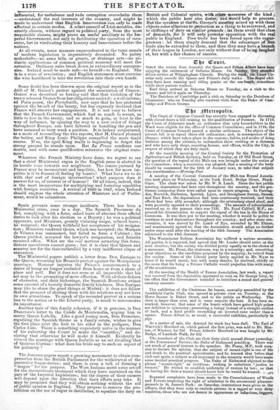Some doubt has been thrown upon the original report as
to the drift of M. Guizot's protest against the annexation of Cracow. Guizot was described as having said that that violation of the treaty released France from her obligations under it: a well-inform- ed Paris paper, the Portefeuille, now says that he has protested against the breach of the treaty, but has expressly declared that France will observe her engagements. It is not easy to believe that the French Government, which had so much to resent, so little to lose in the treaty, and so much to gain, at least in the Way of influence, by opening the way to a new order of things throughout Europe, can have faltered in handling the pen and have assumed so very weak a position. It is indeed conjectured, as a mode of reconciling the two reports, that M. Guizot planned the bolder, and King Louis Philippe compelled the more timid course. If so, the aged King really is beginning to forget the strong ground he stands upon. But La Presse confirms our doubts, and with some qualification reiterates the original state- Thent.
Whatever the French Ministry have done, we regret to see that a chief Ministerial organ in the English press is abetted in its hostile tone towards our neighbour. The course pursued by France may be inconsistent and impolitic, but how far more im- politic is it to foment ill feeling by taunts! What have we to do with that sort of foreign intervention? what purpose does it answer for us, of interest or of honour ? Of all times, indeed, this is the most inopportune for multiplying and fostering squabbles With foreign countries. A revival of 1840 in 1847, when Ireland ehould engross the whole attention of Ministers and of Perlis- Men; would be calamitous.


























 Previous page
Previous page